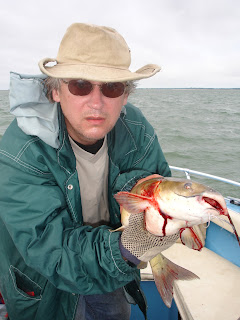
I've been asked more times than I’d care to count: What criteria do you use in deciding where to send your stories? Is there a method to your madness? Or do you use the wet-toilet-paper-approach, tossing malleable wads onto high ceilings in hopes of something sticking? Seems somewhat juvenile, somewhat aimless. Better to have a plan, a target, a
something. I’m not certain what I have, or what approach I use, although I will say this: I’m not willing to pay to publish.
Don’t get me wrong, I’ve already paid a price … in time, in frustration, in anger, in loneliness, in heartbreak, in _____, _____, and _____ (please feel free to fill in the blanks with all the afflictions currently available to middle-aged hacks such as myself).
I read a book review in the local paper this weekend announcing the debut novel of a young writer in my very own stomping ground. I didn’t
oooh and
aaah. Instead, I investigated her publishing history. What did I find? Not much. A fancy website. A poorly written excerpt from her book. Xlibris … such a dirty, dirty word … (the name of a self-publishing company). They chased after my money once. Why not? I’d gotten slighted in a writing contest with an honorable mention.
I received an email from George Dila, author of the impressive short story collection
The End of the World. Here’s what he had to say about his latest publishing experience (or lack thereof):
A couple of years ago I finished a novel called ‘The Big Bang Theory’ (before the bad sitcom of the same name). Following its completion, I spent a year or so looking for an agent to represent the novel (an ugly process at best, which I could discuss at length). Got a few nibbles, but no offers. Then I spent another year or so sending the ms out to independent publishers who don’t require agency representation. Got a few more nibbles, but ultimately, no luck there, either.Not once did Dila sound bitter in his explanation. Instead, he offers us the fruits of his labor absolutely free on his no-frills website. I’ve read
The Big Bang Theory (my first experience with an internet-based novel). I couldn’t put it d… I mean … I couldn’t stop scrolling and clicking until the very end.
The story’s main character, Lawrence Lesinski, a down and out carpet salesman, tries to leave his boyhood hometown with a tidy sum of money when a small time cop with a thumb size nose pulls him over and hands him a piece of paper. This leads Lawrence, aka Lucky, to a 60-something blind clairvoyant named Winnie Bussle, ten years his senior. Through a series of events, he discovers the fate of his childhood acquaintances (twins Kenny and Karen Kleeber), the murder of their father, the presumed accident of his younger brother Mel at Mongo Brick, and the mysterious disappearance of his high school teacher Riley Harrison. The backdrop for this story is Thompsonburg, a place where turkey vultures roost.
Most chapters start with the history of Thompsonburg, its townsfolk, and the mysteries of the Big Bang Theory, before transitioning into action and dialogue. Dila mixes it up too—changing the POV at pivotal moments: Winnie Bussle’s retelling of her long lost love (how it gave her momentary sight), and Karen Kleeber’s retelling of her father’s murder.
The only negative criticism I have regarding Dila’s novel is the endless notes left for Lucky. Dila’s smart enough not to use this vehicle near the end of each chapter (avoiding appearances of advancing his story with gimmicks). Yet my reaction at times: “Oh God! Not another note.” Maybe it’s just me. Maybe I’m jealous with envy.
Once again, Dila proves that a productive writer is someone who completes a project and moves on to something else, monetary gain or not. I hope that the right person comes along, some agent, some
somebody, and contacts him.
The Big Bang Theory is worth reading. Access it
here.







































